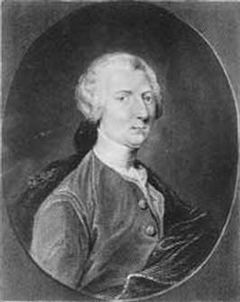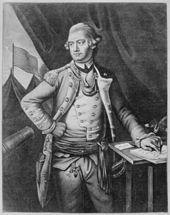- Conway Cabal
-
The Conway Cabal refers to a series of events in late 1777 and early 1778 suggesting that George Washington be replaced as commander of the Continental Army during the American Revolutionary War. It was named after Brigadier General Thomas Conway, whose letters criticizing Washington were forwarded to the Second Continental Congress. When these suggestions (which were often little more than criticisms and expressions of discontent with either Washington or the general course of the war) were made public, supporters of Washington mobilized to assist him politically. Conway ended up resigning from the army, and General Horatio Gates, a leading candidate to replace Washington, issued an apology for his role in the events.
No formal requests were ever made asking for Washington's removal as commander in chief. There was no sign of any formal conspiracy amongst the various malcontents, although Washington was concerned that there might be one. It was the only major political threat to Washington's command during the war.
Contents
Background
In the fall of 1777 forces of the British Army successfully captured Philadelphia, the seat of the Second Continental Congress, which was forced to relocate to York, Pennsylvania. The series of military setbacks (principally the losses at Brandywine in September and Germantown in October) caused many in the Continental Army and Congress to question George Washington's leadership of the war effort. In contrast, the northern army of General Horatio Gates had won a signal victory over John Burgoyne's forces, compelling Burgoyne to surrender his entire army after the Battles of Saratoga. In addition to claiming credit for the victory at Saratoga (which some historians feel was due more to the actions of Benedict Arnold), Gates was politically well connected to Congress.
"Conspiracy" is perhaps too strong a term to use in describing varied actions taken by disaffected officers and Congressional delegates unhappy with the course of the war. Most of those involved shared the view only that Washington was a less than perfect commander in chief, and very few of their activities were coordinated. General Gates was used as a stalking horse to replace Washington, and had himself also engaged in some lobbying for the command, but he was not responsible for the strong response within the Congress. Opposition to Washington's command in Pennsylvania was anchored by Thomas Mifflin, a former Congressional delegate, and also the former quartermaster of the Continental Army who had previously worked closely with Washington. His view of Washington as a rank amateur was supported by Richard Henry Lee, Benjamin Rush, and probably others. A number of French officers who had been commissioned into the Continental Army were also critical of Washington. These notably included Johann de Kalb, Louis Lebègue Duportail, and Thomas Conway.
Conway's letter
Thomas Conway was an Irishman who was educated in France and had served in its military. He joined the Continental Army as a brigadier general, and served with some distinction under Washington during the Philadelphia campaign, although he and Washington did not get along, and his condescending attitude annoyed other American officers as well. General Conway had been appointed as Inspector General of the Army. In October 1777 Conway began lobbying Congress for a promotion to major general, including in his writings criticisms of Washington. Washington opposed Conway's promotion, as he felt there were many American-born officers more deserving of promotion who would be upset by such a move. As part of Conway's efforts, he wrote a letter to Gates in which he was reported to have said, "Heaven has been determined to save your Country; or a weak General and bad Councellors would have ruind [sic] it."[1][2]
General William Alexander (Lord Stirling) received a letter from Gates' adjutant, James Wilkinson, that contained this quotation. He forwarded the letter to Washington, who received it on November 8, 1777. This led Washington to consider the possibility that his subordinates were scheming behind his back to replace him. He was already aware that Gates in particular was politically well connected and popular due to his success at Saratoga.
Washington wrote Conway a brief letter: "Sir, a letter which I received last Night contained the following paragraph. In a letter from Genl Conway to Genl Gates he says", and then quotes the above passage.[2] Conway immediately acknowledged having written to Gates, but denied having written the quoted passage. Conway also again criticized Washington in this letter, writing that "although your advice in council is commonly sound and proper, you have often been influenc'd by men who Were not equal to you in point of experience, Knowledge, or judgement."[2] Washington never saw the actual letter Conway sent to Gates. Henry Laurens did however, and sent Washington an excerpt: "What pity there is but one General Gates! but the more I see of this Army the less I think it fit for general Action under its actual Chiefs [...] I speak [to] you sincerely & wish I could serve under you."[2]
General Mifflin, a man Washington also distrusted, and to whom Conway had also expressed concerns over the army's leadership, informed Gates of what had transpired. Gates wrote a letter to Washington complaining that "[t]hese letters have been stealingly copied" by persons unknown to him, and that he was sending the letter to Laurens, not Washington. This attitude did nothing to placate Washington, and his relationship with Gates deteriorated.[3]
Board of War
From Conway's letter Washington assumed that he and Mifflin were close. In mid-November, Congress decided to appoint Mifflin and Gates to the Board of War. Conway's letter of resignation was referred to the board, which rejected it. Conway was given a promotion to major general, and assigned to a new post, the army inspector general. There is no evidence that any of the participants ever formally attempted to oust Washington.[4]
References
External links
Units By StateConnecticut • Delaware • Georgia • Maryland • Massachusetts • New Hampshire • New Jersey • New York • North Carolina • Pennsylvania • Rhode Island • South Carolina • VirginiaBy Year1775 • 1776 • 1777–1784OtherAdditional Regiments • Extra Regiments • Canadian Regiments (1st • 2nd) • Militia units that participated alongsideEvents Categories:- Political scandals in the United States
- Continental Army
- Continental Congress
- George Washington
- 1777 in the United States
- 1778 in the United States
Wikimedia Foundation. 2010.



